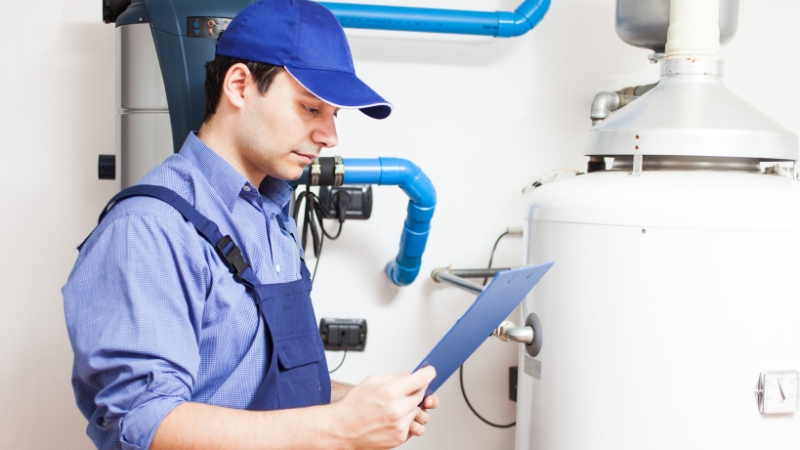In the world of modern home appliances, hybrid water heaters stand out as an innovation that promises efficiency, reliability, and constant hot water supply. Traditional water heaters, whether electric or gas, have served homes for decades, but they come with certain limitations, such as high energy consumption and inconsistent hot water availability. Hybrid water heaters address these issues by combining the best features of conventional water heaters with advanced technology, ensuring a steady and efficient hot water supply. In this comprehensive article, we will delve into the mechanics, benefits, and overall advantages of hybrid water heaters, providing a detailed understanding of why they are an excellent choice for homeowners.
Table of Contents
ToggleWhat is a Hybrid Water Heater?
A hybrid water heater, also known as a heat pump water heater, is a device that combines the features of a conventional water heater with those of a heat pump. This combination allows it to use electricity more efficiently by transferring heat rather than generating it directly. The hybrid water heater extracts heat from the surrounding air and transfers it to the water, which significantly reduces the amount of energy required to heat the water compared to traditional electric water heaters.
Components of a Hybrid Water Heater
- Heat Pump: The heat pump is the heart of the hybrid water heater. It consists of a compressor, evaporator, and condenser. The heat pump draws in air from the surrounding environment, absorbs the heat from the air through the evaporator coil, and then transfers this heat to the water via the condenser coil.
- Storage Tank: Similar to conventional water heaters, hybrid models have a storage tank that holds the heated water until it is needed. The size of the tank can vary, but it typically ranges from 50 to 80 gallons.
- Electric Heating Elements: While the heat pump does most of the heating, hybrid water heaters also include electric heating elements as a backup to ensure a consistent hot water supply during periods of high demand or when the ambient temperature is too low for the heat pump to operate efficiently.
- Thermostat and Control System: The thermostat regulates the temperature of the water in the tank, while the control system manages the operation of both the heat pump and the electric heating elements, ensuring optimal performance and energy efficiency.
How Do Hybrid Water Heaters Work?
The operation of a hybrid water heater involves several key steps:
- Air Intake: The heat pump draws in air from the surrounding environment using a fan. This air passes over the evaporator coil, which contains a refrigerant.
- Heat Absorption: As the air passes over the evaporator coil, the refrigerant absorbs the heat from the air and evaporates, turning into a gas.
- Compression: The gaseous refrigerant is then compressed by the compressor, increasing its temperature even further.
- Heat Transfer: The hot, high-pressure refrigerant gas flows through the condenser coil, where it transfers its heat to the water in the storage tank. As the refrigerant releases its heat, it cools down and returns to its liquid state.
- Hot Water Storage: The heated water is stored in the tank until it is needed. If the demand for hot water exceeds the capacity of the heat pump, the electric heating elements will activate to provide additional heating.
- Control System Management: The control system continuously monitors the temperature of the water and the demand for hot water, adjusting the operation of the heat pump and electric heating elements to maintain a consistent hot water supply.
Benefits of Hybrid Water Heaters
Hybrid water heaters offer numerous benefits, making them a superior choice for many homeowners. Here are some of the key advantages:
- Energy Efficiency: Hybrid water heaters are significantly more energy-efficient than traditional electric water heaters. By using the heat pump to transfer heat rather than generating it directly, they can reduce energy consumption by up to 60%. This translates to substantial savings on utility bills over time.
- Consistent Hot Water Supply: The combination of a heat pump and electric heating elements ensures a reliable and consistent supply of hot water, even during periods of high demand or in colder climates where the ambient air temperature may be low.
- Environmental Benefits: Reduced energy consumption means lower greenhouse gas emissions. By using a hybrid water heater, homeowners can reduce their carbon footprint and contribute to environmental sustainability.
- Longer Lifespan: Hybrid water heaters tend to have a longer lifespan compared to traditional water heaters, thanks to the advanced technology and high-quality components used in their construction. This can lead to lower maintenance and replacement costs over the life of the unit.
- Versatility: Hybrid water heaters can operate in different modes, including heat pump mode, electric mode, and hybrid mode, allowing homeowners to optimize performance based on their specific needs and environmental conditions.
- Enhanced Features: Many hybrid water heaters come equipped with advanced features such as Wi-Fi connectivity, allowing homeowners to monitor and control their water heater remotely using a smartphone app. This can help to optimize energy usage and provide greater convenience.
Installation and Maintenance
While hybrid water heaters offer numerous benefits, proper installation and maintenance are essential to ensure optimal performance and longevity. Here are some important considerations:
- Professional Installation: Due to the complexity of hybrid water heaters, professional installation is recommended. A qualified technician can ensure that the unit is installed correctly, with proper ventilation and electrical connections.
- Location: Hybrid water heaters require adequate space and ventilation to operate efficiently. They should be installed in a location with sufficient airflow, such as a basement, garage, or utility room.
- Regular Maintenance: Routine maintenance is crucial to keep the hybrid water heater running smoothly. This includes tasks such as cleaning the air filter, checking the refrigerant levels, and inspecting the heat pump components. Regular maintenance can help to prevent issues and extend the lifespan of the unit.
- Monitoring and Adjustments: Homeowners should regularly monitor the performance of their hybrid water heater and make any necessary adjustments to the settings. This can help to optimize energy efficiency and ensure a consistent hot water supply.
Cost Considerations
While the initial cost of a hybrid water heater can be higher than that of a traditional water heater, the long-term savings on energy bills can offset the upfront investment. Additionally, there may be rebates and incentives available for homeowners who choose to install energy-efficient appliances such as hybrid water heaters. Here are some factors to consider:
- Upfront Cost: The initial cost of a hybrid water heater can range from $1,200 to $2,500, depending on the brand, model, and capacity. This is higher than the cost of a traditional electric water heater, which typically ranges from $300 to $600.
- Energy Savings: The energy savings provided by a hybrid water heater can result in significant cost reductions over time. According to the U.S. Department of Energy, a typical family can save up to $350 per year on their energy bills by switching to a hybrid water heater.
- Rebates and Incentives: Many utility companies and government programs offer rebates and incentives for homeowners who install energy-efficient appliances. These incentives can help to offset the initial cost of the hybrid water heater and make it a more affordable option.
- Long-Term Investment: While the upfront cost of a hybrid water heater is higher, the long-term savings on energy bills and the extended lifespan of the unit make it a worthwhile investment for many homeowners.
Conclusion
Hybrid water heaters represent a significant advancement in water heating technology, offering a reliable, energy-efficient, and environmentally friendly solution for homeowners. By combining the best features of conventional water heaters with advanced heat pump technology, hybrid water heaters provide a consistent hot water supply while reducing energy consumption and lowering utility bills. While the initial cost may be higher, the long-term benefits and savings make hybrid water heaters an excellent choice for those looking to upgrade their home’s water heating system. With proper installation, regular maintenance, and careful monitoring, a hybrid water heater can provide years of reliable service, ensuring that homeowners never have to worry about running out of hot water again.
Experience Excellence in Hybrid Water Heaters with Garcia Home Restoration!
We understand the importance of having a reliable and efficient water heating system in your home. Our dedicated team of licensed experts leads the way in providing exceptional hybrid water heater solutions that ensure both energy efficiency and consistent performance.
Beyond just water heater installations and repairs, Garcia Home Restoration offers comprehensive home maintenance solutions. Our reputation in Contra Costa County is built on unwavering quality, unmatched expertise, and the trust of numerous satisfied clients. Don’t compromise when it comes to your home’s comfort and energy efficiency. Contact us today for outstanding hybrid water heater services and embrace a worry-free plumbing future!




